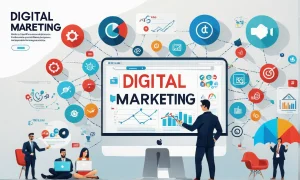Digital business refers to the use of digital technologies to create new value in business models, customer experiences, and internal capabilities. It’s more than just having a website or social media presence. It involves leveraging technology to transform the way a business operates.
Why Digital Business Matters
In today’s fast-paced world, digital business is essential. Every industry is seeing a shift towards digitalization. Companies that don’t adapt may find themselves falling behind competitors. A digital business can quickly adjust to market demands, streamline processes, and reach a global audience with ease.
Benefits Of Digital Business
1. Improved Customer Experience
One of the top benefits of digital business is the enhanced customer experience. Through websites, mobile apps, and social media, businesses can engage with customers 24/7. This helps in building strong relationships and gaining valuable customer feedback.
2. Increased Efficiency
By automating tasks, digital business helps companies save time and money. Businesses can automate customer support, sales processes, and data management. This results in fewer errors and a more efficient workflow.
3. Better Decision-Making With Data
Digital businesses have access to a wealth of data. This data can be analyzed to understand customer behavior, market trends, and operational performance. With these insights, businesses can make better decisions and stay ahead of the competition.
4. Global Reach
The internet allows digital businesses to expand beyond borders. Even small businesses can now compete in international markets. With digital tools, reaching a global audience has never been easier or more cost-effective.
Examples Of Digital Business Transformation
1. E-commerce
Retail businesses have embraced digital business by moving their operations online. E-commerce platforms allow companies to sell products directly to consumers, eliminating the need for physical stores.
2. Remote Work Solutions
The rise of remote work is another example of digital business. Companies have adopted cloud services, collaboration tools, and communication platforms to support employees working from home.
3. Digital Marketing
Businesses are using digital marketing strategies to promote their products and services. SEO, social media, and email marketing have become critical tools for driving traffic and increasing sales.
How To Start A Digital Business
1. Develop a Strong Digital Strategy
Before diving into the world of digital business, companies need a solid digital strategy. This includes understanding the target audience, identifying digital tools, and setting clear goals.
2. Invest in the Right Technology
Technology is at the heart of digital business. Companies need to invest in the right software, hardware, and platforms. This might include a customer relationship management (CRM) system, a robust website, or marketing automation tools.
3. Embrace Continuous Learning
The digital landscape is always changing. Businesses must stay up-to-date with the latest trends and innovations. Continuous learning and adaptation are essential for success in the digital business world.
Conclusion
Digital business is not just a trend—it’s the future of commerce. Companies that embrace digital tools and strategies will enjoy increased efficiency, better customer engagement, and the ability to compete on a global scale. Now is the time for businesses to start their digital transformation journey.



